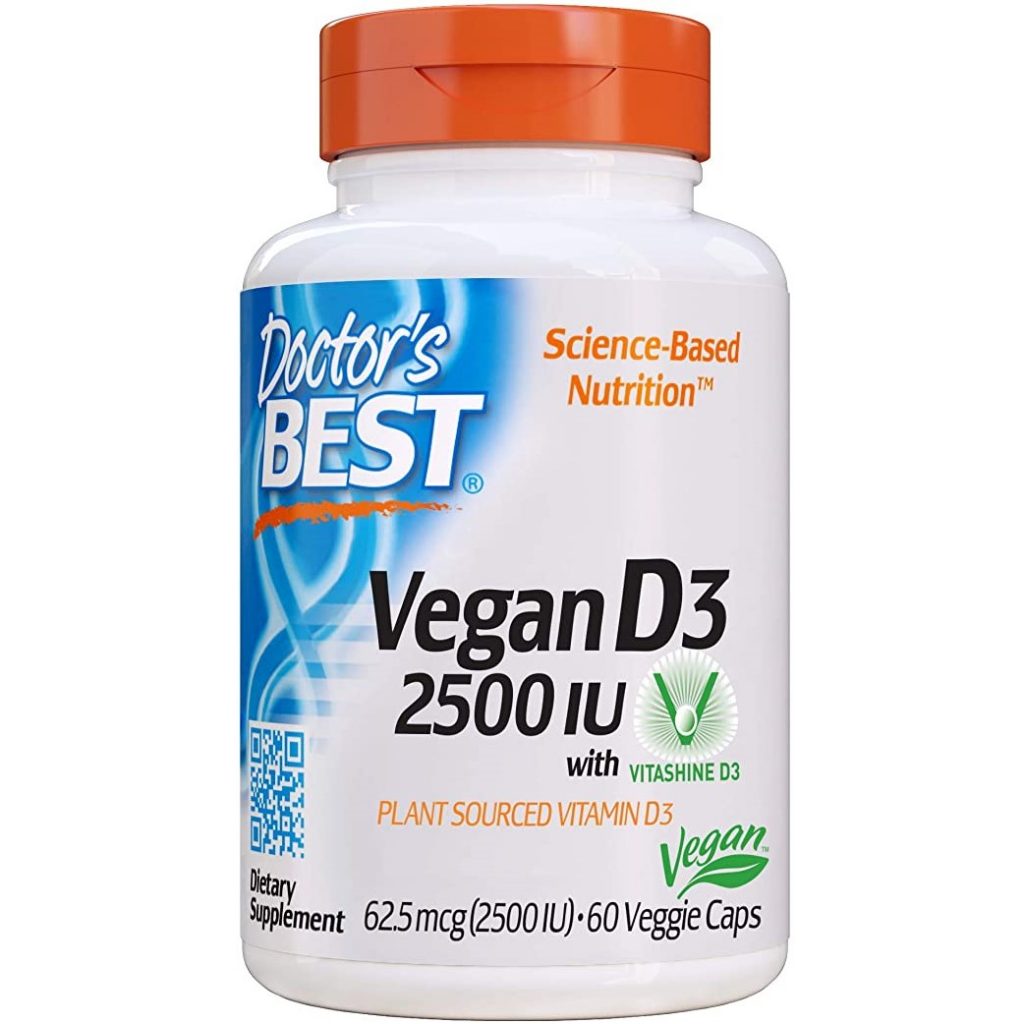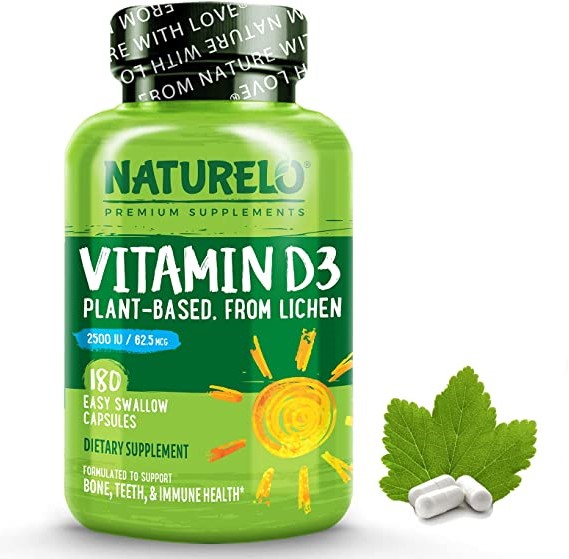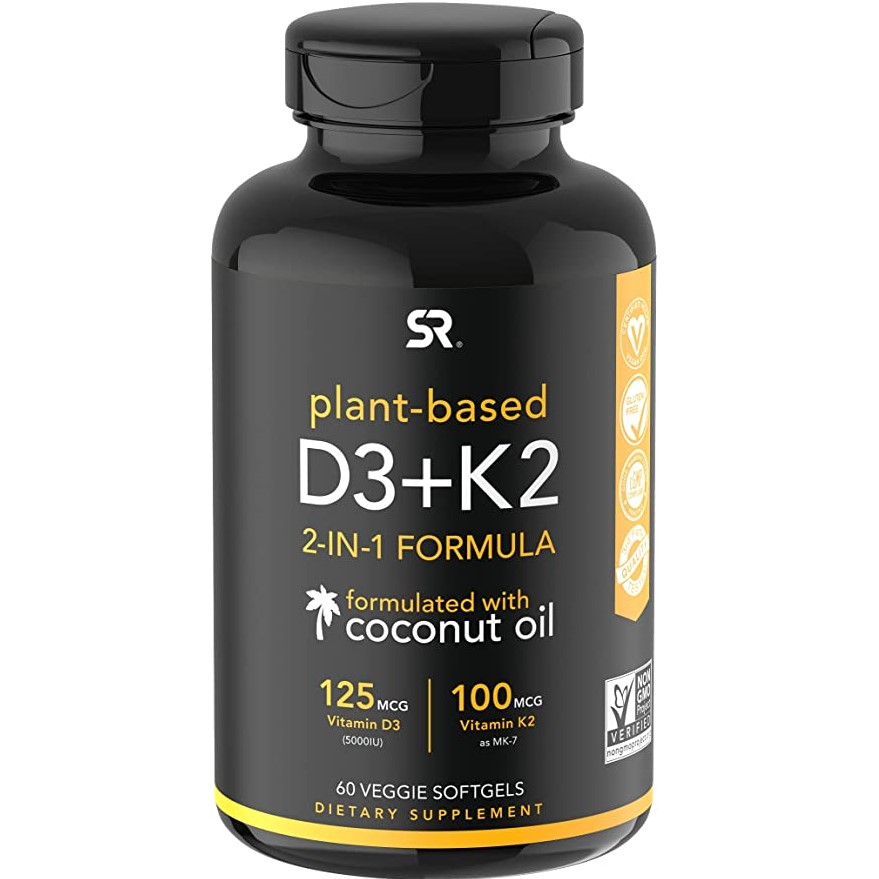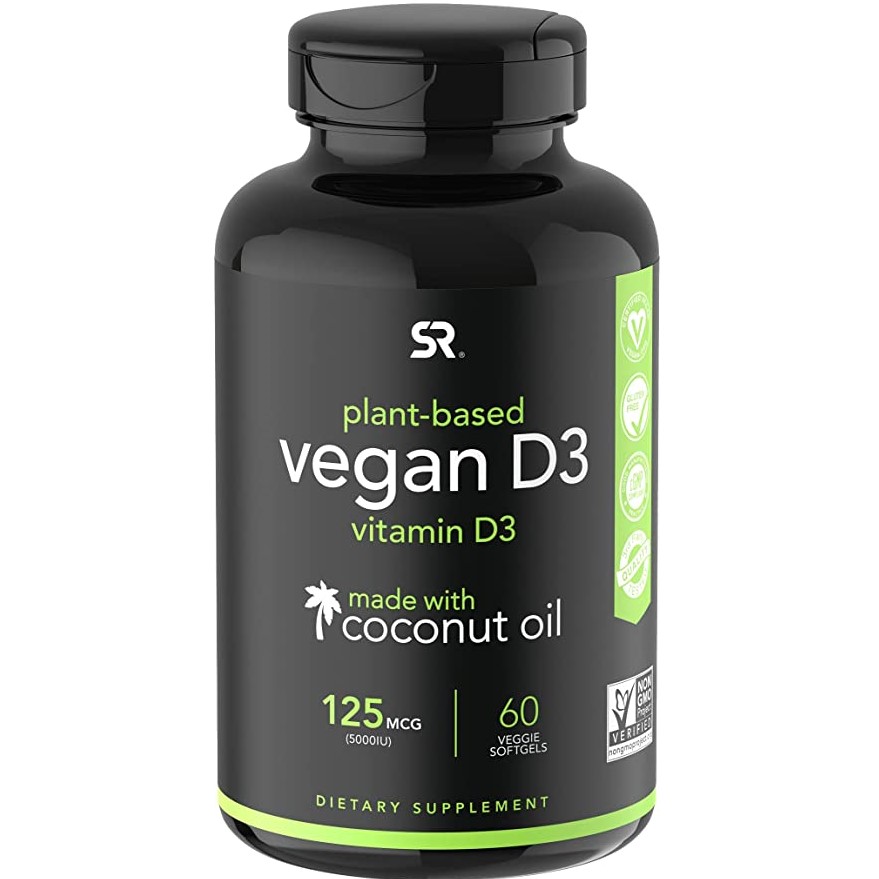Vitamin D is a fat-soluble nutrient that helps your body absorb calcium, build strong bones, and supports your immune system.
Vitamin D is technically not a vitamin but a family of nutrients with similar chemical structures, and the most common sub-types are vitamin D2 and D3.
Although vitamin D can be found in various foods, most of its natural sources are animal products, which begs the question – is vitamin D3 vegan?
Vitamin D is often called ‘the sunshine vitamin’ because your skin produces it when exposed to sunshine, and it plays a crucial role in heart health, your immune system and physical development, to name a few. However, deficiencies are common worldwide, and an estimated 40% of Americans are vitamin D deficient, though many cases go undiagnosed as the symptoms are often very mild.
Furthermore, people on vegetarian or vegan diets are more likely to be vitamin D deficient, as many natural sources of vitamin D – such as dairy, fish and meat – are animal-based. Vitamin D3, in particular, can only be found in animal-based foods, though it is often extracted and added to foods to ‘fortify’ them, but is vitamin D3 vegan in this form?
Table of Contents
What is Vitamin D3 and What Does It Do?
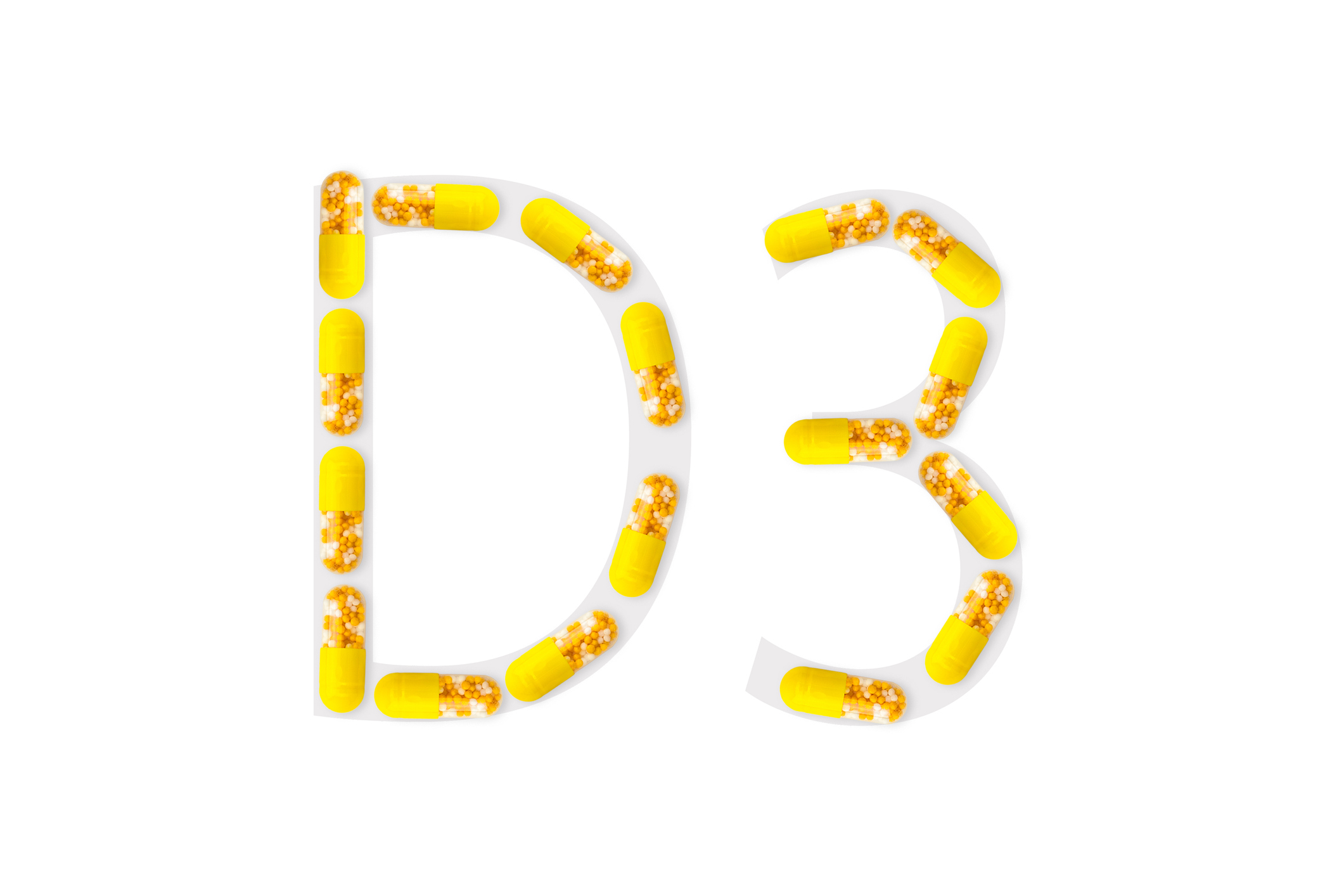
The main difference between Vitamin D2 and D3 is that vitamin D3 (AKA cholecalciferol) is naturally found in animals and is produced by the skin under sunlight, while vitamin D2 (ergocalciferol) is found in some plants. Although both forms of vitamin D help control your calcium and phosphate levels, D3 is considered superior because it raises your overall vitamin D levels more and lasts longer in the body.
RELATED: Read our blog on the differences between vitamins D1, D2 and D3 to learn more about the benefits of this powerful nutrient.
In addition to the primary benefits of vitamin D – supporting strong bones, physical development and a healthy immune system – there is evidence that vitamin D:
May Fight Disease
Research shows that maintaining healthy vitamin D levels helps reduce your risk of Multiple Sclerosis (MS), heart disease, and some other severe illnesses. For these reasons, people on restricted diets are strongly advised to take vitamin supplements even if they aren’t sure whether is vitamin D3 vegan.
May Regulate Mood
Vitamin D may help regulate mood and reduce the risk of depression, as studies show that people experiencing negative emotions notice improved symptoms after taking vitamin D supplements. Vitamin D supplementation is especially effective in treating Seasonal Affective Depression (SAD), linked to reduced exposure to sunlight and lowered Vitamin D levels during winter.
May Help you Lose Weight
Low vitamin D levels are linked to higher rates of obesity, and supplementing with vitamin D can help you lose weight (in addition to a weight loss diet plan). If you’re looking to lose weight with vitamin D, try to prioritise diet and exercise before asking is vitamin D3 vegan, as there is limited evidence that it’s an effective weight loss aid.
Where Do Vegans Get Their Vitamin D3 From?
Low vitamin D levels are a widespread problem – largely caused by dietary and lifestyle factors – partly because very few foods naturally contain vitamin D. It can be especially tough to get enough of this nutrient from your diet if you’re vegetarian or vegan, as most foods that do contain vitamin D are animal products.
Still, there are several vegan-friendly ways to get more vitamin D, so you can enjoy the health benefits of this powerful nutrient without having to ask yourself is vitamin D3 vegan, such as:
The Sun

Your skin naturally produces vitamin D3 when exposed to sunlight, and most people get at least some of their vitamin D this way. The National Institute of Health (NIH) recommends exposing your arms, legs, face or back to sunlight for 5-30 minutes twice weekly should generate healthy vitamin D levels, though you may need more time depending on your location and climate.
Mushrooms

Mushrooms produce vitamin D when exposed to UV light, making them the only known edible plant source of vitamin D, though most commercial mushrooms aren’t exposed to UV light and contain very little vitamin D. However, mushrooms contain vitamin D2, so the answer to the question of is vitamin D3 vegan won’t be found with fungi.
Fortified Foods
Many food producers add vitamin D extracts to their products to ‘fortify’ them to combat vitamin D deficiencies, though the amounts can vary greatly between products. Some examples of fortified vegan foods are:
- Plant-based Milk – Plant milk like oat, almond, rice, and hemp are fortified to offer similar amounts of vitamin D as cow milk – up to 100 IU (2.5 mcg) of vitamin D per cup.
- Non-Dairy Yogurt – Fortified yogurts give around 52 IU (1.3mcg) of vitamin D per 3.5 ounces.
- Tofu – Fortified tofu offers around 100 IU (2.5 mcg) per 3.5 ounces.
- Cereals – Oatmeal and ready-to-eat cereals (like frosted flakes, etc.) are often fortified with vitamin D, providing around 120 IU (3 mcg) per ½ cup.
Supplements

Although the answer to ‘is vitamin D3 vegan’ is no when it comes to natural food sources, there are several vegan vitamin D3 supplements available. Vitamin D3 is normally derived from fish oil or sheep’s wool (lanolin), but vegan supplements use lichen grown in controlled conditions as their vitamin D3 source.
How Much Vitamin D3 Does the Body Need?
To maintain healthy vitamin D levels, adults should get around 600 IU (15 mcg) per day, though it can be tough to reach these levels through their diet alone. Before you start taking vitamin D supplements, you should do your research and pick a product that’s an appropriate strength to help you meet your RDI, which is:
- 400 IU (10 mcg) for infants aged 0–12 months
- 600 IU (15 mcg) for children and adults aged 1–70
- 800 IU (20 mcg) for older adults and pregnant or breastfeeding women
However, some medical professionals believe that these recommended intakes are too low, so it may be worth investing in high-strength vitamin D3 supplements to reach optimal vitamin D levels. But be careful when searching for vegan vitamin D supplements and remember to read the label to see if vitamin D3 is vegan and sourced from plants before buying.
Best Vitamin D3 Supplements
Vitamin D is one of the most beneficial supplements you can buy, especially if you’re on a vegan diet, as vegan food has very little vitamin D, and you may already be deficient. Because vitamin D3 is widely believed to be the best form for raising your vitamin D levels, we’ll be looking at some of the best vegan vitamin D3 supplements to help you maintain healthy vitamin D levels and your vegan diet:
1. Doctor’s Best Vegan D3
Doctor’s Best vegan vitamin D3 supplements come in an easy-to-swallow veggie capsule, contain a hefty 62.5 mcg (2500 IU) per capsule and are certified by the Vegan Society.
What’s more, they display their vegan credentials front and center, so you don’t have to wonder if vitamin D3 is vegan anymore.
2. Naturelo Vitamin D3
Naturelo’s Vitamin D3 supplements contain 62.5 mcg in each capsule and are certified Non-GMO, vegan, gluten-free and made in a US GMP-compliant facility, making them highly potent and reputable.
If you’re looking for an easy, plant-based way to top up your vitamin D levels, you can’t go wrong with these supplements.
3. Sports Research Plant-Based D3 + K2
Vitamin K helps you process calcium and contributes to healthy bones and teeth, especially when combined with vitamin D, as in these veggie soft gels from Sports Research. What’s more, both vitamins are derived from plant sources and mixed with coconut oil to create a 100% plant-based supplement that should lay the question of is vitamin D2 is vegan to rest.
RELATED: Read our blog on Vitamin K and D3 to learn more about the benefits of this calcium-boosting combo!
4. Sports Research Plant-Based Vegan D3
For people looking to boost their vitamin D levels in a hurry, look no further than these high-strength vitamin D3 supplements from Sports Research.
Unlike the previous entry, they don’t have vitamin K but do contain 125 mcg (625% of your RDI) of vitamin D3 in each veggie soft gel, which should be more than enough to boost your vitamin D levels into optimum levels.
Conclusion
Vitamin D is an essential vitamin with a huge variety of benefits, though many people suffer from mild deficiencies without realising, especially those on restricted diets. Because many natural sources of vitamin D are unavailable to vegans (like fish and cheese) or lacking in modern lifestyles (such as sunlight), supplements are a great way to maintain healthy vitamin D levels.
However, many vitamin D supplements come from animal sources, and vitamin D3 is commonly derived from sheep’s wool in the form of lanolin or sometimes from lichen grown under certain conditions. The different sources of vitamin D3 mean that there is no simple answer to the question “is vitamin D3 vegan?” though the supplements recommended in this article are all vegan, as they have been sourced from lichen.
If you follow a vegan diet, we strongly recommend taking vitamin D3 supplements to meet the recommended daily intake and read the label carefully to make sure you only take D3 sourced from lichen.

